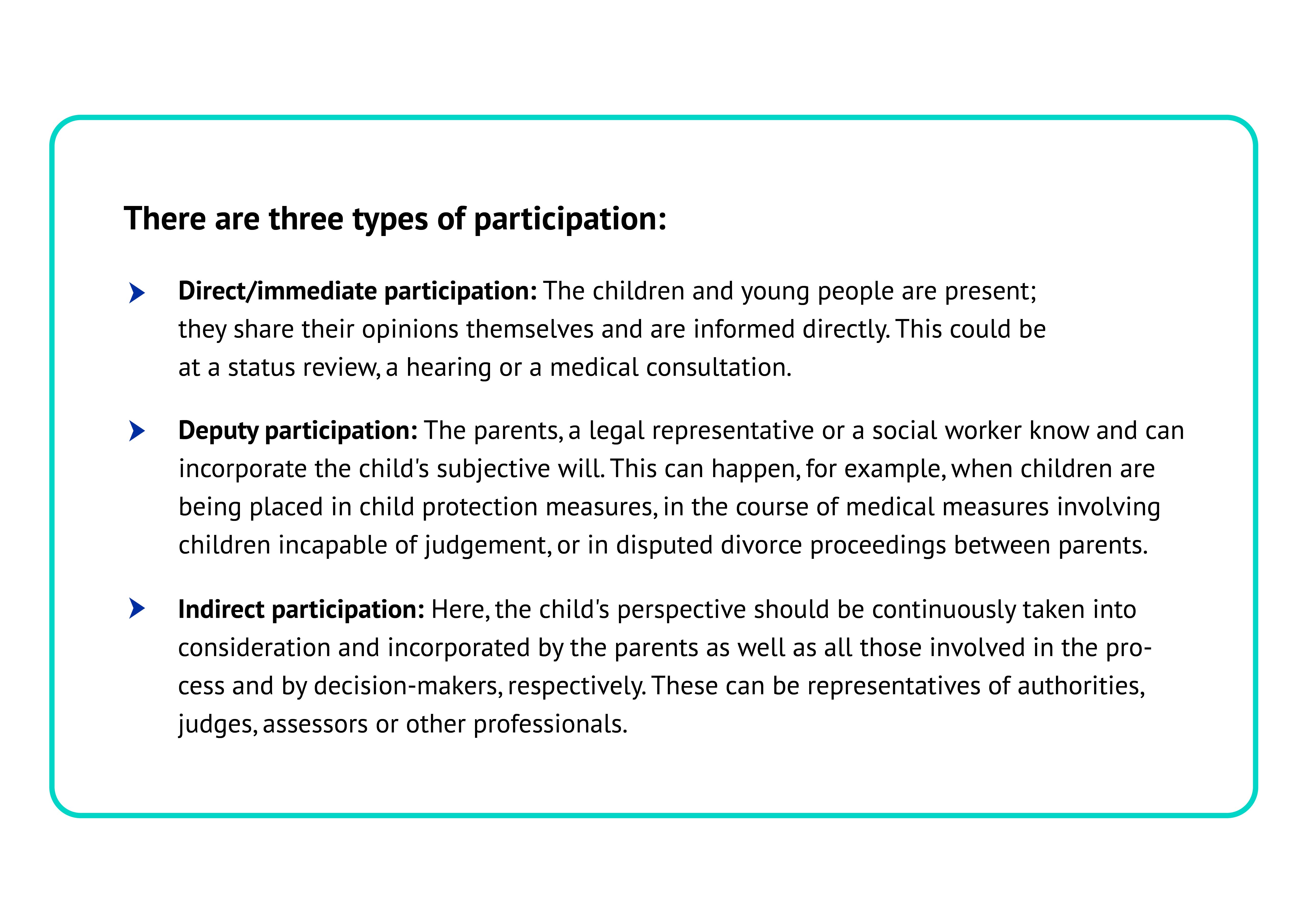Every year in Switzerland, over 100,000 children and young people come into contact with the legal system. All of them have the right to participation. Far too often, however, this right is disregarded and children and young people are not heard when decisions that affect them are being made. As the independent national Ombuds Office Children’s Rights Switzerland, our central task is to ensure that all professionals involved have the same understanding of participation and are working together to safeguard its implementation.
What is meant by participation?
To be a part of things, to play a role, to be active and present – that is participation. In the legal context, Article 12 of the UN Convention on the Rights of the Child states that every child who is capable of forming their own views, feelings and wishes may express them freely, and that these must be given due weight. To this end, the child must be given ample opportunity to be heard either directly or through appropriate representation.
The right to participation is at the very heart of children's rights. The child has the right to express themselves on all issues of life and on their rights, as illustrated in the following diagram:

Participation in the legal system
Ensuring participation for children is a complex endeavour that encompasses people in a wide range of professions, all of whom provide different perspectives. This makes it all the more important that everyone has a shared understanding of participation.
In the legal system, the participation of the child means that they
- are informed about their rights
- are provided with adequate opportunities for access to justice
- are questioned and heard in proceedings that concern the child
Throughout, it is especially important that children's views and perceptions are appropriately taken into account, also in consideration of their level of development and any possible difficulties in communication. All of these factors are essential in the interests of true participation. Children are full legal subjects and, accordingly, they must be taken seriously.

Participation as a process
In legal proceedings, participation should be understood as a process. The information exchange and dialogue between children and adults is not a single or one-off action. Of course, listening to children is a central component of participation in any proceeding, which is why we will be returning to the topic of child-friendly hearings in another blog article. For participation to take place, children must remain informed and involved also before and after the hearing on a matter. This is vital for ensuring that they understand how their own views and those of adults are taken into account, and the impact of this on the outcome of the process.
The right balance between helplessness and overstrain
Every child and every legal case is different. The extent to which a young person should or can be involved in a process must always be reassessed. The following stage model of nine stages from level 1 (instrumentalisation) to level 9 (self-organisation) illustrates the challenges of participation. Accordingly, to prevent either under-involvement or overstrain, it is crucial that the child's individual abilities are correctly assessed.
A participation level that is too high can overwhelm the child that has not reached a sufficient level of development. Children should not be confronted with issues and decisions that they are unable to understand and process. If, on the other hand, the participation level is set too low or is omitted, this can trigger feelings of powerlessness and lead to resignation. Against this backdrop, involved professionals should choose the right and highest possible level of participation to suit the situation and the child.
A misplaced desire to protect
Still today, children frequently miss the opportunity to participate altogether, often out of a desire for their protection and the notion that they must not be burdened unnecessarily. However, research in the area of resilience shows that the opposite occurs: If children experience self-efficacy and feel that they are taken seriously, this has a positive effect on their resilience. Conversely, if children feel ignored or even manipulated, there is a risk that they withdraw, close themselves off or adopt a stance of opposition, which can complicate entire proceedings. However, the greatest harm is to the child, with consequences that can be potentially devastating.
Advice example – School law
Vlora, a 14-year-old, has been the victim of bullying at school for a long time. She is teased about her appearance and kicked or pushed when no adults are around, such as in the changing or locker rooms, during group work or in the hallways. She has tried to raise the topic with teachers but they play down her fears and tell her that things will improve in time. The class teacher has discussed Vlora's situation with the class, but the bullying has not stopped. The girl is increasingly in distress and often skips school.
Vlora’s aunt got in touch with the Ombuds Office Children’s Rights Switzerland. Our first step was to arrange a telephone appointment with Vlora to inform her about her rights. We explained how she could participate actively in her situation and suggested contacting the school social workers. She was advised to describe the situation to them and to discuss the measures the school is taking and the support they can offer. The school social workers then worked together with the entire class – including the teacher – on the topic of bullying. Not only did Vlora’s situation improve, but the whole class was ultimately able to benefit. In Vlora's case, several of her rights were not being respected: the participatory rights to information, to be heard and express her opinions freely, as well as the right to grow up free of violence, to physical and mental integrity, and to education. The Ombuds Office Children’s Rights Switzerland was able to prevent further bullying and further violence. Vlora was not the only child that benefited from our support: Her story motivated other teachers to address the issue of bullying in their classes, which in turn improved the situation of other children at her school. Vlora's example shows that every situation in which we are able to bring our expertise helps to make our legal system more child-friendly, step by step.
Professionals have an obligation
Professionals are obliged to implement the rights of children. Do you deal with children in legal proceedings in your profession? Do you notice that children are unable to exercise their rights but are unable to change this situation on your own? Then show the children how they can get in touch with us!You can find out more about protecting children through participation in our in-depth article published in the latest edition of “undKinder” magazine from the MMI – Marie Meierhofer Institute for the Child.

Our flyer for children and young people
Such professionals include child and youth representatives, social workers, CAPA employees, judges, public prosecutors and youth prosecutors, legal child representatives, victim support advisers, assessors, mediators, therapists, school social workers, prison employees, police officers, teachers, migration specialists, doctors, sports directors, foster parents or employees of children’s homes, and others.

Marie Meierhofer Institute for the Child
The Marie Meierhofer Institute for the Child (MMI) is a recognised institute for early childhood. The institute is occupied with the preconditions for successful development and the prevention of problematic developmental processes.
The MMI is working at the interface of developmental psychology, early childhood education and familial-sociological expertise, and combines practice and research in a multi- and transdisciplinary approach.
The MMI is an associated institute of the University of Zurich.










